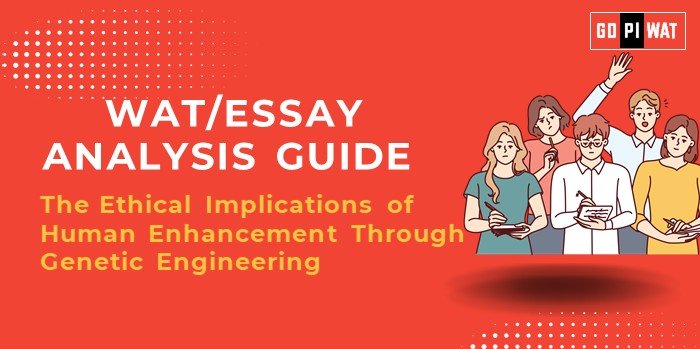📋 Written Ability Test (WAT) / Essay Analysis Guide
🌐 The Ethical Implications of Human Enhancement Through Genetic Engineering
🌟 Understanding the Topic’s Importance
Genetic engineering lies at the intersection of technology, ethics, and societal impact, making it a critical topic for future leaders who may navigate its regulatory, corporate, or societal implications.
⏱️ Effective Planning and Writing
- Time Allocation:
- 🕒 Reading & Planning: 5 minutes
- 🖊️ Writing: 20 minutes
- 🔍 Review: 5 minutes
✍️ Introduction Techniques for Essays
- Contrast Approach: “While genetic engineering promises disease cures, it also risks creating societal inequalities.”
- Solution-Based: “The key to harnessing genetic engineering ethically lies in robust global frameworks.”
📖 Structuring the Essay Body
- Achievements: Outline breakthroughs like CRISPR and their impact on health.
- Challenges: Highlight ethical concerns and regulatory issues with examples.
- Future Outlook: Suggest paths for ethical innovation and regulation.
📄 Concluding Effectively
- Balanced Perspective: “Genetic engineering’s promise must be matched by ethical caution to ensure societal benefits outweigh risks.”
- Global Comparison: “Drawing from global precedents like the EU’s strict regulations could help guide ethical use.”
📚 Sample Short Essays
- Balanced Perspective: “Genetic engineering presents unparalleled opportunities, but caution is essential to prevent societal harm.”
- Solution-Oriented: “Robust ethical guidelines can ensure genetic enhancements benefit all, not just the privileged few.”
- Global Context: “By learning from global leaders like the EU, we can create ethical frameworks for genetic technologies.”
💡 Insights for Success
This guide equips candidates with tools to master discussions and essays on genetic engineering, offering a structured yet adaptable approach to the topic. By combining achievements, challenges, and forward-looking perspectives, candidates can present compelling, well-rounded arguments.


